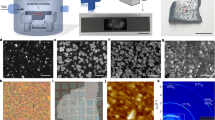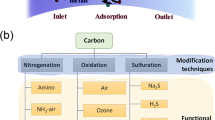Abstract
MESSRS. C. O. DAVIS and H. L. Johnston report1 that when metallic sodium is dissolved in heavy water, the diplogen content of the evolved hydrogen is reduced and the diplogen content of the solution correspondingly increased. We wish to put forward the results of similar experiments, which have been carried out in a somewhat different way and seem to lead to a more precise interpretation of this reaction.
This is a preview of subscription content, access via your institution
Access options
Subscribe to this journal
Receive 51 print issues and online access
$199.00 per year
only $3.90 per issue
Buy this article
- Purchase on Springer Link
- Instant access to full article PDF
Prices may be subject to local taxes which are calculated during checkout
Similar content being viewed by others
References
J. Amer. Chem. Soc., 56, 492,Feb. 1934.
Cremer and Polanyi, Z. phys. Chem., B, 19, 443; 1932.
Horiuti and Polanyi, NATURE, 132, 819, Nov. 25, 1933.
This has also been independently recognised by H. Eyring, Proc. Nat. Acad. Sci., 19, 78; 1933.
Author information
Authors and Affiliations
Rights and permissions
About this article
Cite this article
HORIUTI, J., SZARO, A. Reaction of Heavy Water with Metallic Sodium. Nature 133, 327–328 (1934). https://doi.org/10.1038/133327c0
Issue Date:
DOI: https://doi.org/10.1038/133327c0
This article is cited by
-
Das schwere Wasserstoffisotop
Die Naturwissenschaften (1934)
Comments
By submitting a comment you agree to abide by our Terms and Community Guidelines. If you find something abusive or that does not comply with our terms or guidelines please flag it as inappropriate.



